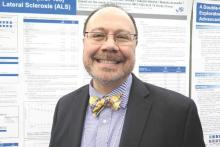VANCOUVER – The antioxidant edaravone was associated with less deterioration in functional rating and quality of life scales when started early in the course of amyotrophic lateral sclerosis (ALS), based on results from a set of trials conducted in Japan and reported at the annual meeting of the American Academy of Neurology.
Edaravone is thought to confer neuroprotection in part through its free radical–scavenging activity and first garnered interest for the treatment of acute ischemic stroke, according to presenting author Dr. Joseph M. Palumbo, vice president and head of Clinical Research at Mitsubishi Tanabe Pharma Development America, the maker of edaravone. It is now approved in several countries for that indication.
In a pivotal randomized phase III trial, Dr. Palumbo and his colleagues studied 137 patients who had definite or probable ALS, were less than 2 years out from symptom onset, had normal respiratory function, and were able to perform most activities of daily living. All patients received standard of care, usually including riluzole (Rilutek), plus either edaravone (MCI-186) or placebo.
After 24 weeks of treatment, compared with placebo, edaravone was associated with a smaller decline in scores on the Amyotrophic Lateral Sclerosis Functional Rating Scale–Revised (ALSFRS-R) (–5.01 vs. –7.50; difference between groups, 2.49; P = .0013), according to data reported in a poster session at the meeting.
Significant benefit was seen on the limb and bulbar subscales, and there was a trend favoring edaravone on the respiratory subscale. Additionally, patients given edaravone had comparatively less deterioration in quality of life as assessed with the 40-item Amyotrophic Lateral Sclerosis Assessment Questionnaire (ALSAQ-40) (P = .03). Grip strength did not differ between groups, and there were no deaths in either group.
“We are not aware of any other positive phase III study in maybe a generation, since riluzole, in ALS. So we are showing this data and we are hopeful that people are as excited as we are,” Dr. Palumbo said in an interview.
In the area of safety, edaravone and placebo did not differ significantly with respect to the rate of adverse events, with contusion, dysphagia, and constipation predominating. The most common serious adverse event was dysphagia, seen in 12% of each group.
The trial’s findings led to approval of edaravone for treatment of ALS in Japan, where it is marketed as Radicut. Additionally, the U.S. Food and Drug Administration (FDA) granted edaravone orphan drug designation for ALS but has not approved it for this indication.
An additional 24-week open-label extension study among 123 patients from the trial, in which all received the drug regardless of their initially assigned treatment, showed that the benefit of edaravone was durable. Patients who continued treatment with the drug had less of a decline from baseline in ALSFRS-R score than did peers switched to the drug from placebo (difference between groups, 4.17; P = .004), according to data reported in another poster. Also, the former had a lower risk of death (P = .019) and less decline in lung function. Meanwhile, the drug’s safety profile remained good.
The researchers are preparing their findings for journal submission and are revisiting the drug’s regulatory status in the United States, according to Dr. Palumbo. “We’re talking to the FDA now. We’ve got our fingers crossed.”
There is no compelling reason to think that the drug’s efficacy in the U.S. population would differ from that in the Japanese population, but that will ultimately be an issue for regulators to decide, he said.
It is difficult to compare edaravone with other ALS treatment options, as all patients in the trial concomitantly received standard of care, Dr. Palumbo explained. “We can only speak about standard of care, and we think that we’ve improved on standard of care here,” he maintained.
The initial phase III trial of edaravone in ALS, which enrolled a population having a wider range of disease severity, failed to meet its primary endpoint of improvement in ALSFRS-R score (Amyotroph Lateral Scler Frontotemporal Degener. 2014;15:610-7). An extension study in 181 patients, also reported in a poster at the meeting, supported post hoc findings hinting that the timing of drug initiation was important.
“We learned a tremendous amount in that study about who the patients were who would ultimately benefit,” Dr. Palumbo commented. “We had a number of hypotheses. One hypothesis was that if we found patients who in fact were still functional at baseline and who really had the diagnosis – they had either definite or probable ALS – and still had very good respiratory function, that we would likely find a signal there.”


